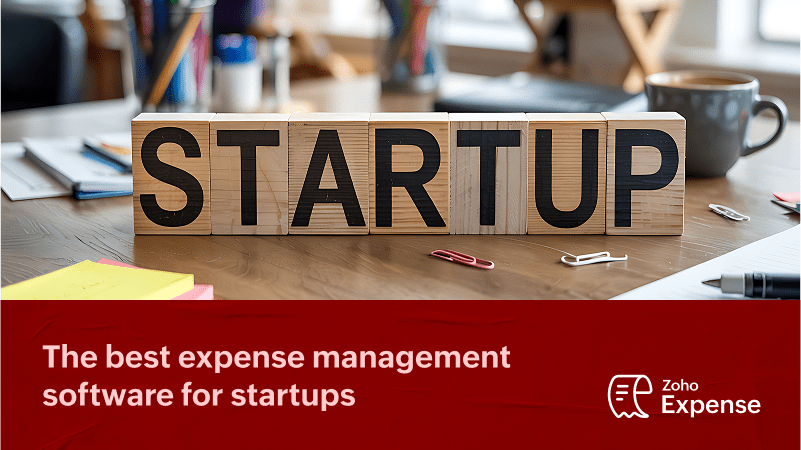- HOME
- Expense Management
- Choosing the best expense management software for startups
Choosing the best expense management software for startups
At any given point in time, a business's ability to monitor and control its spending is paramount. And in the current challenging macroeconomic uncertainty, where businesses face high inflation, supply chain disruptions, and heightened policy uncertainty, every financial decision is under scrutiny. Tools like automated expense management software are no longer a luxury but a necessity for businesses to navigate these challenges and ensure long-term sustainable success.

Why is automated expense management more important for startups?
Startups are lean and agile entities with rapid growth as their main target, while traditional organizations, being large and stable, pursue steady expansion. They differ in size and approach, which also affects their structural aspects. In contrast, most startups have flat and non-hierarchical teams where employees wear different hats for swift decision-making. Regarding resource allocation, startups operate in an extremely frugal way, putting their limited funds into depleting critical, short-term tasks that assure the survival of the company. With their payments always shifting and evolving along with the markets, the expenditure management needs to be automated so it remains compliant and employees can dedicate their very best productivity towards their primary functions.
How startups should choose the right expense management software
Below are a few factors a startup should consider before selecting an expense management software.
User-friendliness for all finance and non-financial staff
More often in a startup, employees multitask and take up various roles. So, software should be user friendly and have a DIY interface ensuring higher adoption.
Scalability
A core attribute for any startup is rapid growth, and any software should be able to scale along with the same. Choose software with features that support multi-regional and multi-currency management, global tax compliance, multiple in-app languages, OCR support, and more.
Compatibility with existing IT ecosystem
Expense management software should be able to integrate with existing accounting, banking, and HR platforms.
Customizable approval workflow
Startups work on a flat hierarchical structure, and software should be reflective of the same. It should be able to customize the approval workflow based on the hierarchy.
Mobile-first approach
New age-startups mostly work in a hybrid environment and on the go, making it necessary for an expense management app to be mobile first.
Real-time reporting for fast insights and investor queries
Ensure software has real-time reporting capabilities for founders and investors to have faster access.
Fraud detection and compliance
Ensure automated policy enforcement to flag out-of-policy spending in real time, stay compliant with regional tax laws, and maintain advanced audit trails for all transactions, including receipt information and exchange rate tampering.
Vendor reputation and customer reviews
Always choose credible and trustworthy vendors who have been in business for at least 10 years. Any shutdown or acquisition of the vendor will put your critical data at risk. Always look for customer reviews from various sources, too.
Availability of onboarding and post-sale support
Choose software with dedicated onboarding support and ongoing post-sales service for business continuity.
Transparent pricing
Watch out for any hidden costs for features, feature usage limits, and support costs.
Key factors to consider for implementing automated expense management
Get buy-in from investors
Ensuring buy-in from founders, investors, and employees and providing necessary onboarding and training to the stakeholders is always the best choice.
Data security
The platform should comply with industry-accepted standards of data security to make sure data is secure as well as compliant.
Customization
The software should be configurable, customizable, and adaptable to match changing company policies and guidelines.
Assess ROI
It is always smart to carry out a cost-benefit analysis based on parameters like time saved, error reduction, compliance improvements, and fraud loss mitigation.
Common mistakes to avoid
Overbuying
Never choose a complex tool for straightforward business requirements that employees can easily learn and adopt.
Ignoring scalability
Stay away from software that can't scale up with the rapid growth of startups.
Onboarding time
Do not underestimate implementation, onboarding time, and change management.
Conclusion
It could be said that startups can use automated expense management as a transformational tool that will provide time, capital protection, and expansion due to its unmatched ability to streamline expenses. This will also allow startups to follow proactive phases of research, selection, and implementation of the correct solution to their pace and needs.
Are you a startup and looking for a T&E software to scale up when you grow? Choose an expense solution that is loved by startups. Start by booking a personalized demo with Zoho Expense.
- Satheesh KP
Satheesh heads global product marketing at Zoho Expense & Spend , a part of Zoho's Finance Suite. He has 17+ years of industry experience across multiple industries and regions. His areas of interest include technological advancements in finance, travel and expense management, spend management, and more.
